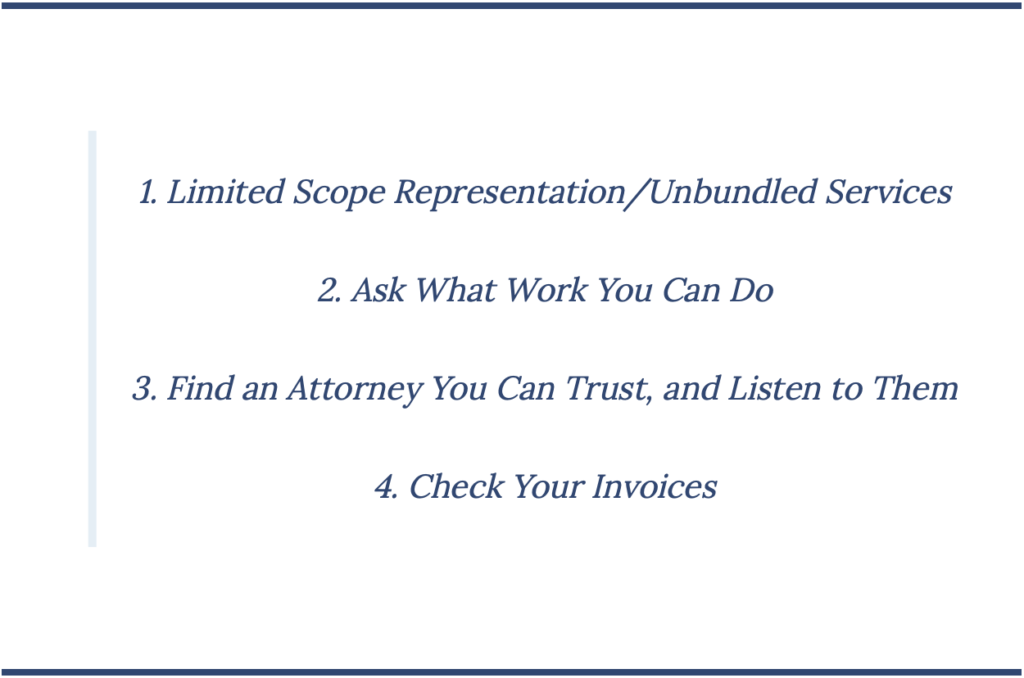Attorney’s fees in any kind of legal proceeding can add up quickly, but that doesn’t mean you just have to accept that it will be outrageously expensive. Here are four ways to save on attorney’s fees:
Consider Limited Scope Representation/Unbundled Services
Most people think either an attorney handles your case for you or you handle the case completely on your own. There is a third option though, known as “unbundled services” or “limited scope representation.” Under an unbundled services arrangement you can represent yourself, but consult with an attorney to help you as needed throughout the process. This means that you have access to legal guidance and advice when needed, but because you’re handling the majority of the work associated with the case yourself you’re able to truly save on attorney’s fees.

An unbundled services arrangement can be a great approach for some people and some cases, but there are key weaknesses to the arrangement to consider as well. It’s wonderful to have an experienced attorney in your corner to help guide you through your case, but it’s not truly helpful if you don’t use them or know what questions to ask when you do. If you’re wholly unfamiliar with domestic courts and the process you’re facing then an unbundled arrangement likely isn’t the way to go. Likewise, if your case is unique or particularly complex you will need an experienced attorney engaged on the case more than may be possible under an unbundled services arrangement. For more information on unbundled services, please see my post here: https://www.dillielaw.com/blog/unbundled-services-your-guide-to-the-third-option-in-hiring-an-attorney/.
Ask What Work You Can Do
Even if you have an attorney that fully represents you, there are some tasks you can take on yourself in order to cut costs. For example, all domestic cases require full financial disclosures to be exchanged between the parties, including Sworn Financial Statements that detail monthly income and expenses as well as a list of assets and debts. The parties are also required to exchange financial documents in support of the Sworn Financial Statement. Reviewing the financial documents and putting together drafts of the Sworn Financial Statements can take up a good deal of time, so taking on that task yourself would reduce the work your attorney/paralegal has to do and ultimately reduce the costs of your case.
While most of the work in the case will require the experience and knowledge of an attorney, there are likely some tasks that you can take off of your attorney’s plate to save on attorney’s fees, so be sure to ask.
Find an Attorney You Can Trust, and Listen to Them
No matter what type of case you have, finding an attorney that you can trust is a critical first step. For more thoughts on how to find the right attorney, and what to ask at your first meeting, you can see my article on that here: https://www.dillielaw.com/blog/what-to-ask-at-your-initial-consultation-with-an-attorney/
Once you’ve found a knowledgeable, experienced, and trustworthy attorney, be sure to trust them. Going through a divorce or any other type of legal proceedings can be an emotional experience, but do what you can to keep your emotions from getting the best of you and unnecessarily complicating things. Your attorney knows the law and is in a great position to advise you about if a position is justifiable, if a settlement offer is reasonable, and how the law applies to your case. Not listening to or trusting your attorney to steer you in the right direction on those questions can lead to prolonged cases, unnecessary hearings, and ultimately much higher costs.
Check Your Invoices
Most family law and criminal law attorneys charge hourly rates for the work done on a case. Attorneys and others working on the case (paralegals, investigators, etc.) will track and log the time spent on the case as well as any other costs incurred (travel time, coping costs, filing fees, etc.) All those charges are entered into a billing system one way or another and despite best efforts mistakes can and do happen. Go line by line over the invoices you receive to make sure that each charge logged was in fact related to your case and that the billing rate and amount of time entered are both correct.
One mistake on one invoice may not make a huge difference, but you’ll get several invoices over the course of a case and even small mistakes can add up quickly. You want to make sure that there aren’t any mistakes unnecessarily running up the charges on the case, so check your invoices carefully!
If you have any questions about your case in general feel free to reach out to me directly at DillieLawOffice@gmail.com or (720) 507-3105.
